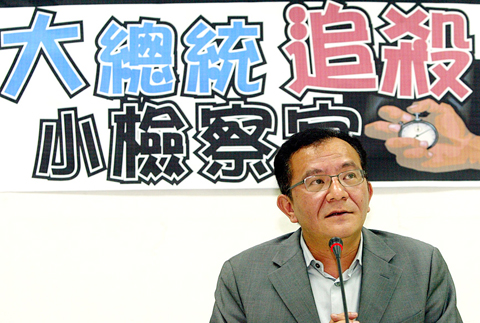President Ma Ying-jeou (馬英九) has filed an appeal at the Taipei District Court after prosecutors decided not to indict Hou Kuan-jen (侯寬仁), a prosecutor on the Special Investigation Panel (SIP) of the Supreme Prosecutors Office, for forgery.
Taipei District Court spokesperson Huang Chun-ming (黃俊明) said yesterday the court received a letter of committal for trial in March from Ma’s attorney, but the court has yet to announce its ruling.
Hou was one of the prosecutors investigating Ma’s handling of his special allowance funds when he was Taipei mayor, minister of justice, vice chairman of the Mainland Affairs Council and other posts.

PHOTO: LIN CHENG-KUNG, TAIPEI TIMES
Ma sued Hou for forgery in January last year, alleging that Hou had inaccurately documented his questioning of Wu Li-ju (吳麗洳), a Taipei City Government treasurer, about Ma’s use of his mayoral special allowance.
Last year Ma asked the court to remove three prosecutors from his cases for “bias.”
State Public Prosecutor-General Chen Tsung-ming (陳聰明) rejected the request.
At a meeting last year with the Arbitration Association of the Republic of China, Ma made a reference to his own legal woes by saying that more attention should be paid to accurately documenting questioning sessions.
Although Ma has dropped several of the lawsuits he filed during the presidential campaign last year, he did not drop the charges against the prosecutors who investigated him for graft.
Attorney Billy Chen (陳達成) said Ma’s appeal was a way of “killing a chicken to scare the monkeys,” a Chinese idiom meaning to make a big show of punishing one person to elicit fear in others.
If Ma had anything against the prosecutor, he did not have to use judicial means because he was the president and has the power to demote prosecutors, who are civil service employees, Chen said.
“If [Ma] is dissatisfied with a prosecutor, he only has to tell the premier, who can order the minister of justice to demote [or punish by other means] the prosecutor,” Chen said, but such a low-key action would not serve as a warning to other prosecutors and investigators.
Presidential Office Public Affairs Department director Tsai Chung-li (蔡仲禮) said that Ma decided to appeal not out of personal interest but to serve as an example to others because every citizen could encounter such a situation.
“It is not a small matter,” Tsai said said. “It is a matter of principle and judicial justice and an important part of the judicial reform. He will set an example.”
Special Investigative Panel spokesperson Chen Yun-nan (陳雲南) visited the Presidential Office yesterday afternoon, but Tsai said he did not meet Ma.
While Minister of Justice Wang Ching-feng (王清峰) said she respected the president’s right to appeal, Democratic Progressive Party (DPP) Legislator Gao Jyh-peng (高志鵬) was critical of Ma.
“Big president bullies small prosecutor,” Gao said, adding that Ma was narrow-minded and he could not forgive being indicted.
Gao called on Ma to respect the results of the investigation.
ADDITIONAL REPORTING BY KO SHU-LING AND RICH CHANG

Intelligence agents have recorded 510,000 instances of “controversial information” being spread online by the Chinese Communist Party (CCP) so far this year, the National Security Bureau (NSB) said in a report yesterday, as it warned of artificial intelligence (AI) being employed to generate destabilizing misinformation. The bureau submitted a written report to the Legislative Yuan in preparation for National Security Bureau Director-General Tsai Ming-yen’s (蔡明彥) appearance before the Foreign Affairs and National Defense Committee today. The CCP has been using cognitive warfare to divide Taiwanese society by commenting on controversial issues such as Taiwan Semiconductor Manufacturing Co’s (TSMC, 台積電) investments in the

INVESTIGATION: The case is the latest instance of a DPP figure being implicated in an espionage network accused of allegedly leaking information to Chinese intelligence Democratic Progressive Party (DPP) member Ho Jen-chieh (何仁傑) was detained and held incommunicado yesterday on suspicion of spying for China during his tenure as assistant to then-minister of foreign affairs Joseph Wu (吳釗燮). The Taipei District Prosecutors’ Office said Ho was implicated during its investigation into alleged spying activities by former Presidential Office consultant Wu Shang-yu (吳尚雨). Prosecutors said there is reason to believe Ho breached the National Security Act (國家安全法) by leaking classified Ministry of Foreign Affairs information to Chinese intelligence. Following interrogation, prosecutors petitioned the Taipei District Court to detain Ho, citing concerns over potential collusion or tampering of evidence. The

‘COMPREHENSIVE PLAN’: Lin Chia-lung said that the government was ready to talk about a variety of issues, including investment in and purchases from the US The National Stabilization Fund (NSF) yesterday announced that it would step in to staunch stock market losses for the ninth time in the nation’s history. An NSF board meeting, originally scheduled for Monday next week, was moved to yesterday after stocks plummeted in the wake of US President Donald Trump’s announcement of 32 percent tariffs on Taiwan on Wednesday last week. Board members voted to support the stock market with the NT$500 billion (US$15.15 billion) fund, with injections of funds to begin as soon as today. The NSF in 2000 injected NT$120 billion to stabilize stocks, the most ever. The lowest amount it

NEGOTIATIONS: Taiwan has good relations with Washington and the outlook for the negotiations looks promising, Minister of Economic Affairs J.W. Kuo said Taiwan’s GDP growth this year is expected to decrease by 0.43 to 1.61 percentage points due to the effects of US tariffs, National Development Council (NDC) Minister Paul Liu (劉鏡清) said at a meeting of the legislature’s Economics Committee in Taipei yesterday, citing a preliminary estimate by a private research institution. Taiwan’s economy would be significantly affected by the 32 percent “reciprocal” tariffs slapped by the US, which took effect yesterday, Liu said, adding that GDP growth could fall below 3 percent and potentially even dip below 2 percent to 1.53 percent this year. The council has commissioned another institution